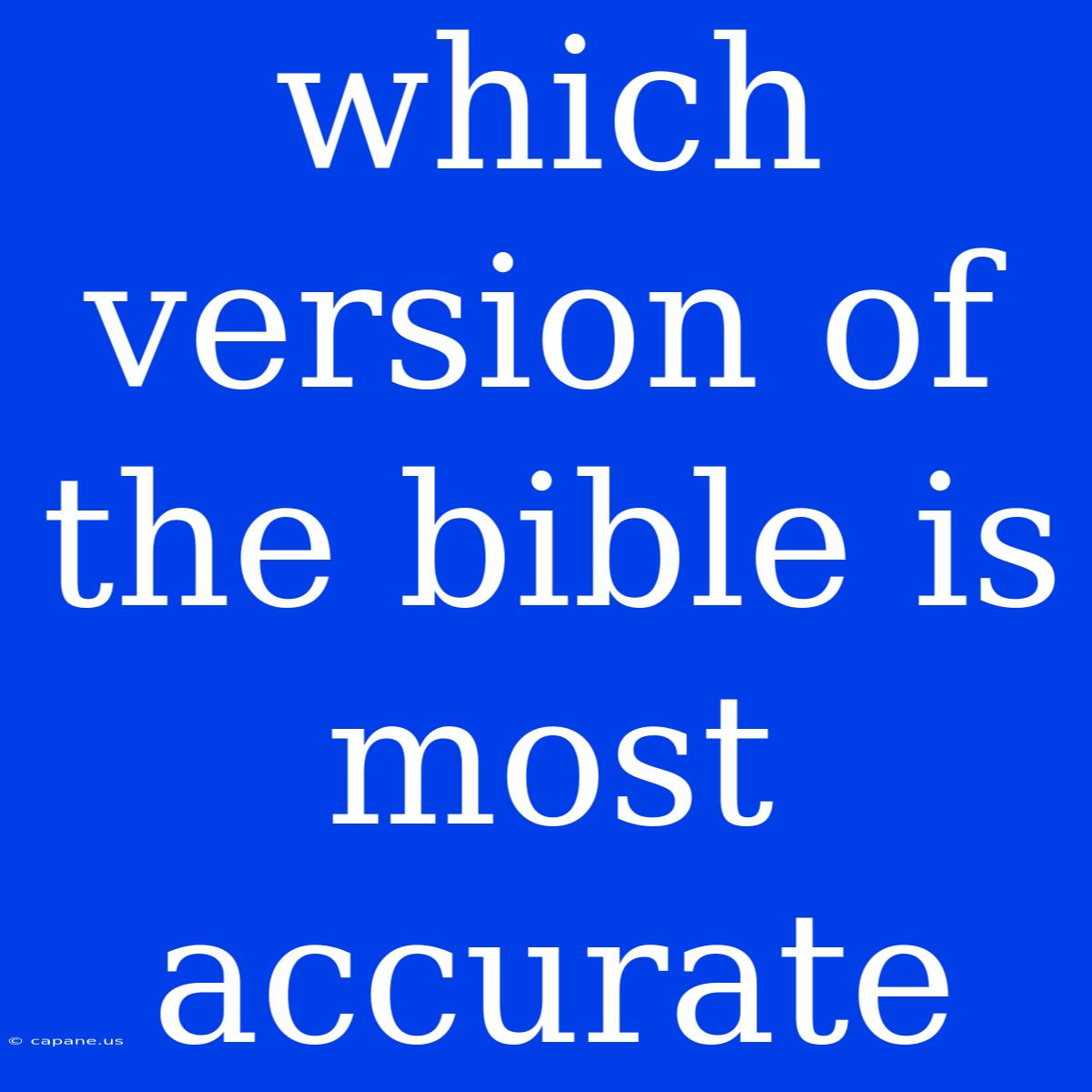Which Version of the Bible is Most Accurate? Unraveling the Complexities of Translation
The question of which Bible version is "most accurate" is a complex one, often stirring debate among scholars and believers. There's no single, definitive answer, as accuracy depends on the specific criteria used for evaluation. It's crucial to understand that each version aims to convey the original meaning, but the methods and choices made during translation can lead to variations in nuance and emphasis.
Editor Note: The quest for the most accurate Bible version remains a crucial topic for Bible readers and scholars alike.
This exploration is important because understanding the nuances of different translations empowers readers to make informed choices about which version best suits their needs and enhances their understanding of the Scriptures.
Our analysis involved a deep dive into the history of Bible translations, examining the various approaches and methods employed. We researched the different translation philosophies, including literal, dynamic equivalence, and paraphrases, and their implications for the accuracy of the text.
Key Takeaways of Bible Translation
| Feature | Explanation |
|---|---|
| Original Texts | The Bible was originally written in Hebrew, Aramaic, and Greek. |
| Translation Methods | Different methods aim to capture the original meaning, with variations in word-for-word accuracy and the intended audience. |
| Accuracy | Accuracy depends on the translation method, the translator's expertise, and the criteria used to assess it. |
| Version Variety | Numerous Bible versions exist, catering to different needs and audiences. |
| Reader Purpose | Consider your specific needs and preferences when choosing a version. |
Understanding the Key Aspects of Bible Translations
Original Texts and Languages
The Bible was written in Hebrew, Aramaic, and Greek, reflecting the cultural context of the time. Understanding these languages is crucial for accurate translation.
Translation Methods
1. Literal Translations: These versions aim to translate the original text word-for-word, often resulting in a more difficult read for modern audiences. Examples include the New American Standard Bible (NASB) and the English Standard Version (ESV).
2. Dynamic Equivalence Translations: These versions prioritize conveying the meaning and intent of the original text in a way that is natural and understandable for modern readers. Examples include the New International Version (NIV) and the New Living Translation (NLT).
3. Paraphrases: These versions offer a more conversational and informal rendering of the Bible text, intended to make it accessible to a broader audience. Examples include The Message and The Living Bible.
Accuracy and Interpretation
While all versions strive for accuracy, the criteria used to assess accuracy can vary. Some focus on linguistic precision, while others prioritize the overall message and impact. It's important to remember that translation is an art, and interpretations can differ, even among well-respected scholars.
Choosing the Right Version
The best Bible version for you depends on your personal preferences and the purpose of your reading. Consider your reading level, the type of study you're doing, and the context in which you'll be using the Bible.
FAQ
Q: Is the King James Version (KJV) the most accurate version?
A: The KJV was a groundbreaking translation for its time, but it is based on a different set of ancient manuscripts compared to more modern versions. It also uses an archaic language that can be challenging for modern readers.
Q: Should I stick to one Bible version?
A: It can be beneficial to consult multiple versions for a more comprehensive understanding of the text.
Q: What are some good study Bibles?
A: Many study Bibles, such as the NIV Study Bible or the ESV Study Bible, include helpful notes, maps, and background information.
Q: Are there Bible versions for children?
A: Yes, many versions are specifically designed for younger audiences, such as the New International Reader's Version (NIRV) and the Children's Bible.
Q: What about online Bible resources?
A: Online Bible websites and apps provide access to various versions and study tools.
Tips for Choosing a Bible Version
- Consider your reading level and purpose.
- Read reviews and comparisons of different versions.
- Try reading a few different versions to see which one resonates with you.
- Ask other believers for their recommendations.
- Don't be afraid to experiment and find what works best for you.
Conclusion
The quest for the most accurate Bible version is an ongoing one. Understanding the different translation methods and philosophies empowers readers to make informed choices that align with their personal needs and reading goals. It's ultimately about finding a version that helps you connect with God's word in a way that is meaningful and enriching.
The beauty of the Bible lies not only in its content but also in the diverse ways it has been translated to connect with people across cultures and time. The journey to discover the version that resonates most with you is a unique and personal one.

